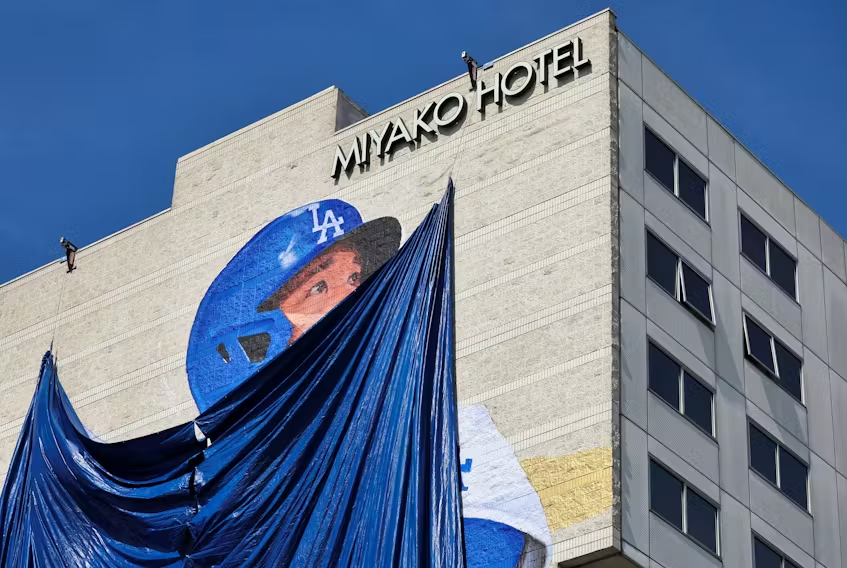Shohei Ohtani’s Bold Move: Transforming an Old Hotel into Micro-Apartments for the Homeless
In a remarkable turn of events, Shohei Ohtani, the Los Angeles Dodgers’ star player renowned for his extraordinary skills as a baseball pitcher and hitter, has embarked on a new mission that transcends the boundaries of sports. Ohtani, celebrated for his incredible achievements on the field, has recently made headlines not for his athletic prowess but for his groundbreaking efforts to address homelessness in Los Angeles. In a move that exemplifies his commitment to social impact, Ohtani has purchased an old hotel with the intention of converting it into 139 micro-apartments designed to provide housing for the homeless.
**A Vision Beyond Baseball**
Shohei Ohtani’s journey from baseball superstar to philanthropist began with a deep-seated desire to contribute meaningfully to the community. Despite his busy schedule and the demands of professional sports, Ohtani has always been driven by a strong sense of social responsibility. His decision to invest in real estate for the purpose of alleviating homelessness reflects a profound understanding of the complexities surrounding this pressing issue.
Los Angeles, a city renowned for its glamour and economic opportunity, is also home to a significant homeless population. The stark contrast between the city’s opulence and the harsh realities faced by many of its residents underscores the need for innovative solutions to tackle homelessness. Ohtani’s venture into affordable housing marks a significant step towards bridging this gap.
**Transforming a Hotel into a Haven**
The hotel purchased by Ohtani is an aging building with a storied past. Once a bustling hub for travelers, the hotel had fallen into disrepair and was facing potential closure. Recognizing the potential of the structure, Ohtani saw an opportunity to repurpose the space into something far more impactful.
The plan involves converting the hotel’s existing rooms into 139 micro-apartments. These compact living spaces are designed to provide not just shelter but a sense of dignity and stability for those experiencing homelessness. Each unit will be equipped with essential amenities, including private bathrooms and kitchenette facilities, aimed at fostering a sense of independence and self-sufficiency.
The design of these micro-apartments is informed by principles of efficiency and comfort. Architects and urban planners have been engaged to ensure that the transformation respects both the building’s historical significance and the needs of its future residents. The goal is to create an environment that is both functional and inviting, offering a genuine home rather than merely a place to stay.
**Addressing the Root Causes**
Ohtani’s initiative goes beyond merely providing a roof over people’s heads. The project is also geared towards addressing some of the underlying issues associated with homelessness. Support services will be integrated into the project, including access to counseling, job training, and health care services. By offering a comprehensive support system, the aim is to empower residents to rebuild their lives and integrate back into the community.
Partnerships with local organizations and charities will play a crucial role in this aspect of the project. These collaborations will ensure that the residents of the micro-apartments have access to the resources and support needed to achieve long-term stability.
**Community and Legacy**
Shohei Ohtani’s commitment to this project reflects a broader trend among athletes and celebrities using their platforms for social good. By leveraging his fame and financial resources, Ohtani is setting a powerful example of how individuals in positions of influence can drive meaningful change.
The impact of Ohtani’s project extends beyond the immediate benefits to the residents. It serves as a catalyst for a larger conversation about homelessness and the potential solutions that can be implemented at the community level. By drawing attention to this critical issue, Ohtani is encouraging others to consider how they, too, can contribute to societal well-being.
Moreover, this initiative has the potential to inspire similar projects across the country. As more people become aware of the effectiveness of such solutions, there may be a greater push towards innovative approaches to addressing homelessness. Ohtani’s project could very well serve as a model for future endeavors aimed at creating sustainable and compassionate solutions for those in need.
**Challenges and Future Outlook**
While the project is undoubtedly ambitious and commendable, it is not without its challenges. Transforming an old hotel into micro-apartments requires navigating various regulatory and logistical hurdles. Ensuring that the renovation work meets building codes and safety standards, managing costs, and coordinating with local authorities are all significant aspects that need careful attention.
However, Ohtani’s track record of excellence and dedication provides a strong foundation for overcoming these obstacles. His involvement brings a high level of credibility and motivation to the project, which can help attract additional support and resources.
The success of this initiative will be measured not only by the number of micro-apartments created but also by the positive changes experienced by the residents. It will be important to monitor and evaluate the outcomes, adjusting strategies as necessary to maximize the project’s impact.
**Conclusion**
Shohei Ohtani’s venture into transforming an old hotel into micro-apartments for the homeless represents a significant and inspiring commitment to social change. By using his resources and influence to address one of the most pressing issues in Los Angeles, Ohtani is demonstrating that sports stars can have a profound impact beyond their athletic achievements.
This project has the potential to create lasting positive change, offering hope and stability to those in need while sparking a broader conversation about effective solutions to homelessness. As Ohtani continues to balance his dual roles as a baseball legend and philanthropist, his actions will undoubtedly inspire others to think creatively and act compassionately in the pursuit of a more equitable society.
